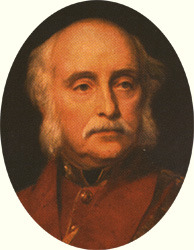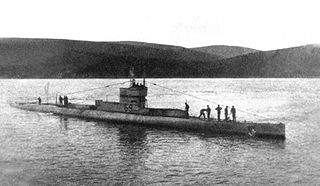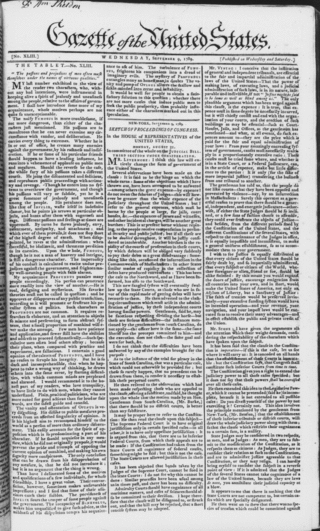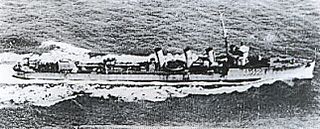
The 1796 United States presidential election was the third quadrennial presidential election of the United States. It was held from Friday, November 4 to Wednesday, December 7, 1796. It was the first contested American presidential election, the first presidential election in which political parties played a dominant role, and the only presidential election in which a president and vice president were elected from opposing tickets. Incumbent Vice President John Adams of the Federalist Party defeated former Secretary of State Thomas Jefferson of the Democratic-Republican Party.

Duplin County is a county located in the U.S. state of North Carolina. As of the 2020 census, the population was 48,715. Its county seat is Kenansville.

The Castle is the last novel by Franz Kafka. In it a protagonist known only as "K." arrives in a village and struggles to gain access to the mysterious authorities who govern it from a castle supposedly owned by Count Westwest.

General Sir Charles William Pasley was a British soldier and military engineer who wrote the defining text on the role of the post-American Revolution British Empire: An Essay on the Military Policy and Institutions of the British Empire, published in 1810. This text changed how Britons thought their empire should relate to the rest of the world. He warned that Britain could not keep its Empire by its "splendid isolation". Britain would need to fight to gain its empire, and by using the colonies as a resource for soldiers and sailors it grew by an average of 100,000 square miles (260,000 km2) per year between the Battle of Waterloo and the American Civil War. Serving in the Royal Engineers in the Napoleonic Wars, he was Europe's leading demolitions expert and siege warfare specialist.

HMS Royal George was a ship of the line of the Royal Navy. A first-rate with 100 guns on three decks, she was the largest warship in the world at the time of her launch on 18 February 1756. Construction at Woolwich Dockyard had taken ten years.

Sir John Malcolm Sabine Pasley, 5th Baronet, FBA, commonly known as Malcolm Pasley, was a British philologist affiliated with the University of Oxford. He was considered the foremost British authority of German studies. Pasley is particularly well known for his dedication to and publication of the works of Franz Kafka.

HMS G9 was a British G class submarine, one of eight Royal Navy submarines known to have been lost to friendly fire in World War I.

The National Gazette was a Democratic-Republican partisan newspaper that was first published on October 31, 1791. It was edited and published semiweekly by poet and printer Philip Freneau until October 23, 1793.
The 1978 Seattle Mariners season was the second in franchise history. The Mariners ended the season by finishing 7th in the American League West with a record of 56–104 (.350).
Kevin Patrick Pasley is a retired professional baseball player whose career spanned 12 seasons. For parts of four seasons, Pasley, a catcher, played in Major League Baseball (MLB) with the Los Angeles Dodgers, and the Seattle Mariners (1977–78). Over his career in the majors, he compiled a .254 batting average with eight runs scored, 31 hits, seven doubles, one home run, and nine runs batted in (RBIs). Pasley hit his only career major league home run in what would prove to be his final at-bat in the majors on October 1, 1978.

The Gazette of the United States was an early American newspaper, first issued semiweekly in New York on April 15, 1789, but moving the next year to Philadelphia when the nation's capital moved there the next year. It was friendly to the Federalist Party. Its founder, John Fenno, intended it to unify the country under its new government. As the leading Federalist newspaper of its time, it praised the Washington and Adams administrations and their policies. Its Federalist sponsors, chiefly Alexander Hamilton, granted it substantial funding; because some of it was directly from the government, the Gazette is considered to have been semi-official. The influence of the newspaper inspired the creation of the National Gazette and the Philadelphia Aurora, rival newspapers for the Democratic-Republicans.

Admiral Sir Thomas Pasley, 1st Baronet was a senior and highly experienced British Royal Navy officer of the eighteenth century, who served with distinction at numerous actions of the Seven Years' War, American Revolutionary War and French Revolutionary Wars. In his youth he was renowned as an efficient and able frigate officer and in later life became a highly respected squadron commander in the Channel Fleet. It was during the latter service when he was awarded his baronetcy after losing a leg at the Glorious First of June, aged 60.

HMS Pasley was an Admiralty M-class destroyer built on the Tyne by Swan Hunter & Wigham Richardson for the Royal Navy and launched on 15 April 1916. She saw service during the First World War.
Pasley is an unincorporated community in Barry County, Missouri, United States. Pasley was originally known as Milwaukee after a store in the community; after a fire destroyed the store in the 1930s, the name was changed to Pasley for a local school.
HMS St. Helena (K590) was a Colony-class frigate of the United Kingdom that served during World War II. She originally was ordered by the United States Navy as the Tacoma-class patrol frigateUSS Pasley (PF-86) and was transferred to the Royal Navy prior to completion. After the British returned her to the United States in 1946, she briefly carried the name USS St. Helena (PF-86).
HMS Pasley (K564), ex-Lindsay, was a Captain-class frigate of the Evarts-class of destroyer escort, originally commissioned to be built for the United States Navy. Before she was finished in 1943, she was transferred to the Royal Navy under the terms of Lend-Lease, and saw service during the World War II from 1943 to 1945. She was the third ship of the Royal Navy to be named Pasley, after Admiral Sir Thomas Pasley (1734-1808), who commanded aboard his flagship HMS Bellerophon at the Glorious First of June in 1794.
The Royal Navy employed two vessels designated as His Majesty's Hired armed vessel Sir Thomas Pasley during the French Revolutionary Wars. The two vessels were named for Admiral Sir Thomas Pasley. The vessels are also sometimes described as cutters, but more generally as brigs. The Spanish captured the first Sir Thomas Pasley. The second had a brief, but highly productive, career that later led to her crew qualifying for the Naval General Service Medal. After she was returned to her owners in March 1802, she may have been wrecked in the Mediterranean that same year.
Jeffrey Lingan Pasley is a professor of American history at the University of Missouri, specializing in the Early Republic.

McDaniel Park is a pocket park in Greenville, South Carolina, near the intersection of McDaniel Avenue and McDaniel Green, adjacent to the Rock Quarry Garden, Cleveland Park. McDaniel Park was dedicated to the Dorothy Haynsworth Garden Club in October 2015; and it features a statue, "Swimmer" (1985), by Jeanne Pasley (Messer) (1918-2013), in memory of Eugenia (Woo) and William Thomason, who died in 2013 of accidental carbon monoxide poisoning.














